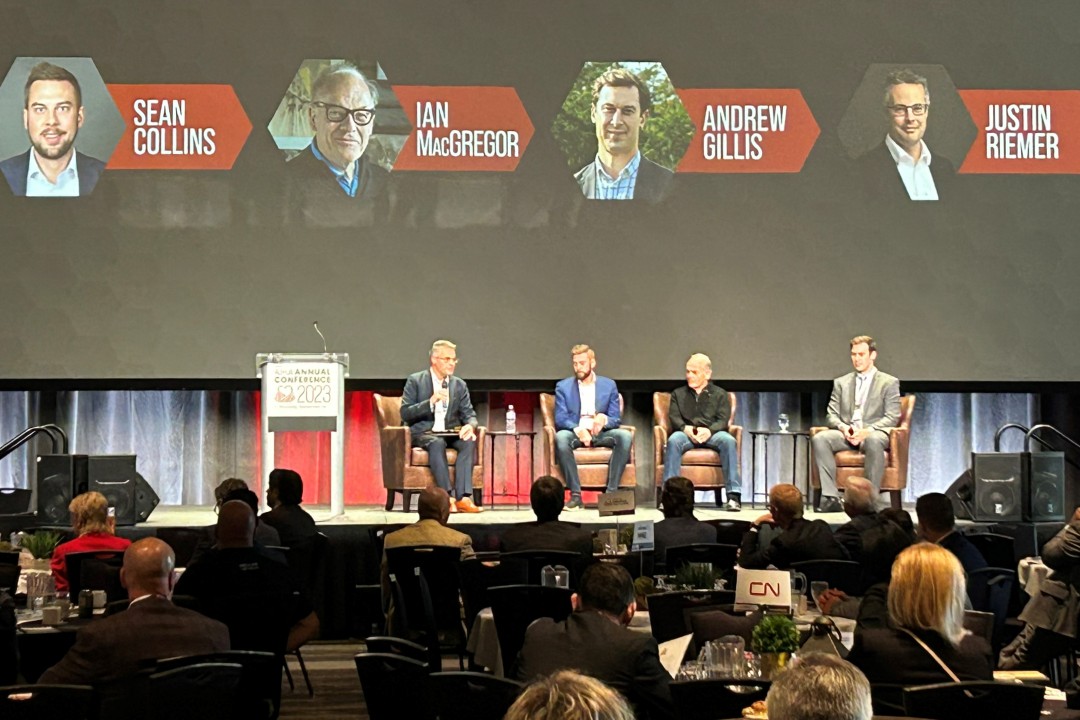Two Edmonton cleantech companies are getting closer to opening facilities in Alberta's Industrial Heartland, where they plan to leverage the area's unique assets.
The CEOs of Varme Energy and Aurora Hydrogen addressed the opportunities they see in energy diversification during a panel discussion at the Alberta's Industrial Heartland Association conference at the Edmonton Convention Centre on Sept. 14.
Starting in 2024, Varme is planning to build a $250-million to $300-million facility to generate electricity from burning trash while capturing its carbon emissions.
"Garbage is almost like coal," CEO Sean Collins told Taproot following the panel. "What I find crazy is that we pay money for coal, to burn it, and we pay money to get rid of garbage. So for us, it's sort of the inversion of that."
The Heartland is an ideal location for Varme because of its proximity to the Alberta Carbon Trunk Line, Collins said.
"We can get lease options that are 1,300 metres away from the largest CO2 pipeline on Earth," he said. "If you're adding 20, 30 kilometres of CO2 pipeline, you're obliterating your economics … We sort of say the Industrial Heartland is the belle of the ball."
Co-panellist Andrew Gillis of Aurora Hydrogen is bringing a pilot plant to the Heartland thanks to a partnership with Sherritt International.
"We're basically borrowing some land from them right now to do the development and leverage some of their professional expertise," Gillis said in an interview. "Once the technology is operational, then we expect to be able to deploy it commercially wherever anyone needs."

Justin Riemer of Emissions Reduction Alberta moderated a discussion with Sean Collins of Varme Energy, Ian MacGregor of Hydrogen Naturally, and Andrew Gillis of Aurora Energy at the Alberta's Industrial Heartland Association conference in Edmonton on Sept. 14. (Colin Gallant)
That technology is hydrogen production by way of methane pyrolysis using microwave technology. Aurora will build "modular, semi-mobile" facilities that don't emit CO2 and can be shipped around the world. It solves two of the problems inherent to existing hydrogen production: a high rate of CO2 emissions and the vast expense (as well as some danger) in shipping.
"(We'll be able to) fabricate and assemble in Edmonton," he said. "If somebody wants hydrogen near the airport, in Calgary, halfway around the world, then we ship those modules, connect them to natural gas and electricity, and we're making hydrogen."
Collins said he expects Aurora to be operational by next year. He didn't disclose the cost of producing the first module.
The panel also included industry leader Ian MacGregor, who was the mind behind the Alberta Carbon Trunk Line and the Sturgeon Refinery.
MacGregor is now the executive chair of Calgary's Hydrogen Naturally, which aims to produce hydrogen by burning wood fibre waste and capturing the resulting carbon, removing fuel for forest fires in the bargain.
"Of course the Heartland is the perfect location for this because of the (trunk line), and because the hydrogen we make can be used by nearby plants to create energy, fertilizer and other uses that benefit from reductions in carbon intensity," he said in a release from the Heartland association.
